There is an army on the march. It belongs to ISIS, the Islamic State of Iraq and Sham

 There is an army on the march. It belongs to ISIS, the Islamic State of Iraq and Sham. It has declared itself the new Caliphate, harking back to the early days of Islam, when the khalifa, meaning ‘successor’ of the Prophet Muhammad, governed the Ummah, the sovereign nation of the faithful. It is a serious crisis that has alarmed all countries for it threatens the stability of the Middle East, and indeed the whole world.
There is an army on the march. It belongs to ISIS, the Islamic State of Iraq and Sham. It has declared itself the new Caliphate, harking back to the early days of Islam, when the khalifa, meaning ‘successor’ of the Prophet Muhammad, governed the Ummah, the sovereign nation of the faithful. It is a serious crisis that has alarmed all countries for it threatens the stability of the Middle East, and indeed the whole world.
ADVERTISEMENT

Illustration/ Devdutt Pattanaik
It all began, some say, with the 1990 Iraqi invasion of Kuwait. This led to the Gulf War, which sparked rage that spiralled itself to the 9/11 tragedy of 2001, which led to America’s War against Terrorism. This led to the killing of Saddam Hussein, dictator of Iraq, and Osama Bin Laden, the Al Qaeda chief who ordered the 9/11 attack, which destabilised the region, reigniting old battles, like between the Turks and the Kurds, and between Shia and Sunni Muslims, the latter having its roots in ancient rivalry between Persians and Arabs. Persians have always had culture and a monarchy — from the days of the Achamenians in the 5th century BCE. They have always looked down on the relatively egalitarian tribal culture of Arabia that had direct links with the founder of Islam, and now has oil money.
Others believe it all started with the end of World War II, when the Ottoman Empire crumbled, and the erstwhile European Imperial powers used the ensuing chaos to establish new nation states, all Muslim but one — Israel. Since then, there has always been turmoil in Levant, the ancient land now associated with Israel, Palestine, Lebanon, Jordan, and Syria (al Sham of ISIS).
Since ancient times, Levant has been known as the land of sea-faring traders, renowned for purple dye and the alphabet with which gave rise to the script with which we now write English. And we often forget that modern Iraq is what was once called Mesopotamia, the land of two rivers, Tigris and Euphrates, while Persia is what is now called Iran.
Mesopotamia gave us some of the most popular tales of the Bible such as the Flood, Noah’s Ark, Tower of Babel, Ten Commandments. From Persia comes the idea of paradise, which essentially means a park within an enclosed space, popular in the palaces of those arid lands.
Mesopotamia and Levant were the lands where the first cities were built 6000 years ago, and where monotheistic mythology originated. Before cities, there were only tribes with people bound by blood relationships and marriage.
With cities, people came to be bound by law that was anchored in a god — the city god who embraced all those who accepted his law. When cities fought each other, it was seen as the battle of the gods. When empires came into being, emperors believed their god was the greater god, and he was the chosen man, and his people were the chosen people. Eventually, the emperors concluded their god was the only god, every other god was false. All cities had to bow to their chosen one god, and accept that single god’s single set of laws, and submit to the one true king who instituted that law.
Of course, the identity of this god who demanded exclusive allegiance changed over centuries. For the Cannanites, he was Baal. For the Persians, he was Ahura Mazda. For the Babylonians, he was Marduk. For the Hebrew tribes, he was Yahweh. For the Arabs, he was Allah, from the Arabic, al ilah, which literally means the God.
The author writes and lectures on relevance of mythology in modern times, and can be reached at devdutt@devdutt.com
The views expressed in this column are the individual’s and don’t represent those of the paper.
 Subscribe today by clicking the link and stay updated with the latest news!" Click here!
Subscribe today by clicking the link and stay updated with the latest news!" Click here!






